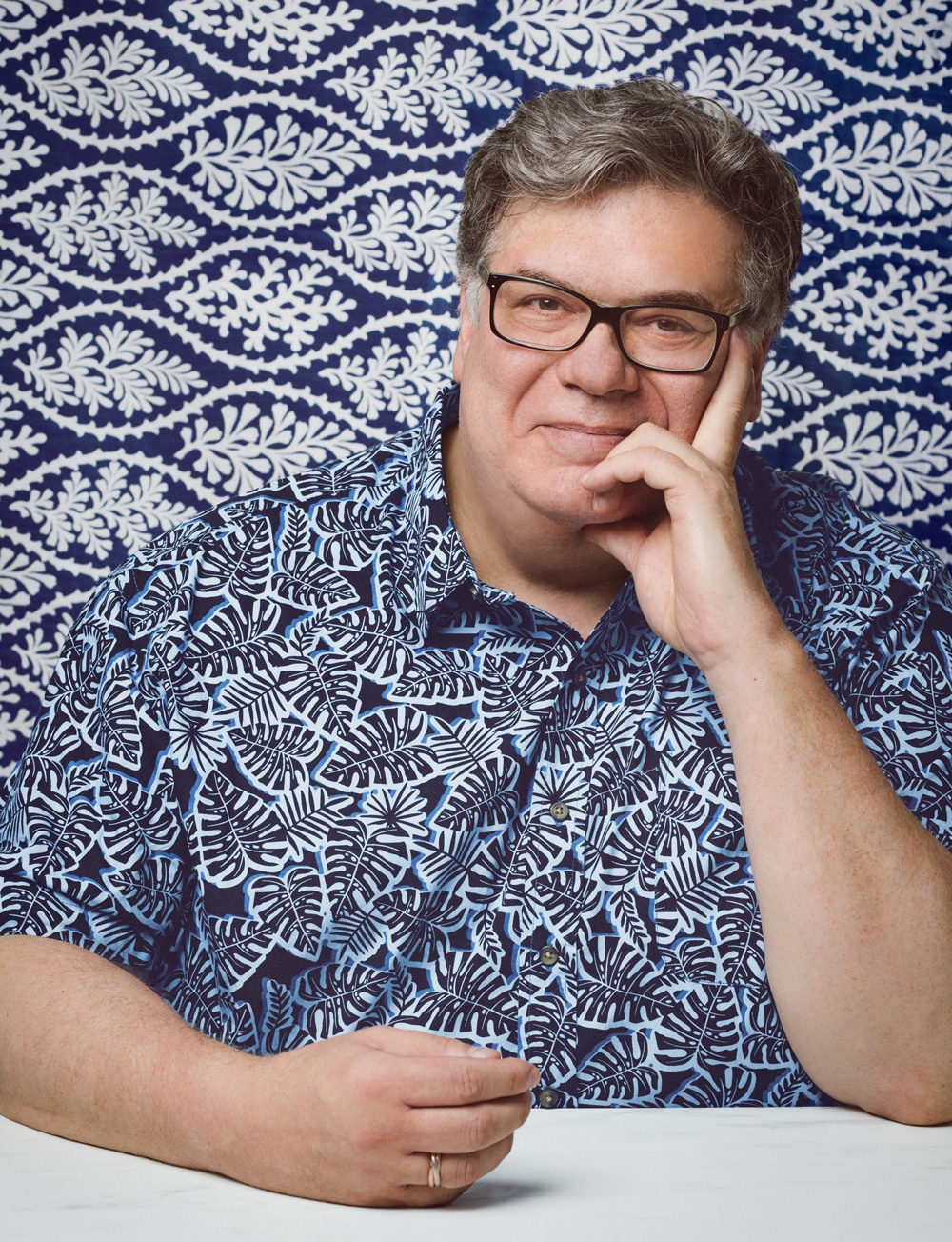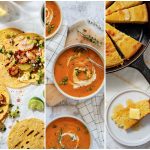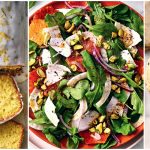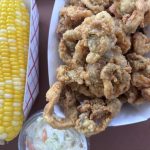At Home at the Table with David Leite
For years, David Leite ran from his Portuguese heritage—until he found his way back by preserving his family’s recipes.

Coffee By Design | Portland, Maine
Photo Credit : Katherine KeenanBy David Leite
The early ’70s. A little before eight on a Friday night. I’m lying on the floor of our den watching TV. My parents sit behind me in their recliners, talking in Portuguese over sections of The Herald News. As I wait for the commercials to end, the nubby carpet dimples a pebbly pattern into my propped-up elbows.
Then it starts. I shush my parents quiet. A crescendo of horns, then voices in unison: “Here’s the story / of a lovely lady / who was bringing up three very lovely girls….”
For the next half hour, I watch, enthralled by the shiny, quintessential American-ness of The Brady Bunch. Bake sales and class presidents. Mod clothes and Hawaiian vacations. All blond hair and blue eyes. This is not my world. I am an American-born son of a large extended family of Azorean immigrants. If TV cameras were turned on us, they’d see something quite different—my Boston aunts in a basement kitchen pounding octopus tentacles with a mallet, their slippers clapping against the cement floor as they worked, while my grandmother, Vovo Leite, swathed in black, bobbles a rosary from her hands.
At our home in Swansea, Massachusetts, things weren’t much different. The house had that low-slung profile of the Brady house—my father, a carpenter, had built it not long before—and our furniture was sleek midcentury modern in every shade of ochre, umber, and sienna. Still, an Old World aura shone through. A statute of baby Jesus standing on a cloud, a real gold crown on his head, sat under a glass dome in my bedroom. In the kitchen, my maternal grandmother, Vovo Costa, sat with her pink-flowered housecoat hiked up, shelling fava beans into a pan between her feet. Whenever I walked in, she’d look up and beam. “Ai, meu coração,” she’d say. Ah, my heart.
By the time I hit my teens, I had come to believe that being Portuguese, with the crush of its dictums and traditions, was an unwanted inheritance, a birthmark I couldn’t remove. I wanted to be Brady-ized, homogenized, to run from my family, my DNA. I wanted to play golf, to sport cardigans with elbow patches. I wanted intellectual conversation, in English. I wanted dinners of pot roast, mashed potatoes, and minted peas. I wanted all the things never played, worn, discussed, or eaten in my small, insular world. I was driven not just by the trappings of class or assimilation; with the dawning awareness that I was gay, fleeing also felt something like survival.

Photo Credit : Photo by Adam Detour | Styling by Catrine Kelty
I spent more than a decade away from Swansea. During that time, I learned to cook non-Portuguese food, traveled internationally, and took classes in art. (I never did buy a cardigan.) Then, in my early thirties, I found my way back home.
That’s when Vovo Costa, my beloved grandmother, my North Star, died. I was unmoored. Bereft, I grasped at ways to hold her close. I found myself craving her recheio, a brick-red bread pudding/stuffing studded with chouriço (pork sausage), and her sopa da galinha, chicken soup with rice and potatoes. But I soon discovered that her recipes were unrecorded. In my grandmother’s day, while some boys, like my grandfather, were educated, she was never taught to read or write. Cooking became her vocation and her voice, a craft perfected through endless repetition, a memoir written each week on the family table.

Photo Credit : Photo by Adam Detour | Styling by Catrine Kelty | Pottery Courtesy of Portugalia Marketplace
There were other family recipes, of course. My mother had her own versions of the same dishes, as did my father’s side of the family. But they weren’t the same.
I began to understand that the culture I had left behind was now leaving me. My cousins, like me, were thoroughly Americanized. The older generation wasn’t cooking as much. More recipes would be lost unless we preserved them.
To work my way back to my family’s food, I turned to my mother. I tackled her take on the classic carne assada em vinha d’alhos (roast beef in wine and garlic). She marinated the beef in my father’s wine, then nestled it with the onions, garlic, and potatoes he grew out back. Mom would stir in links of homemade chouriço that Aunt Irene made in her basement kitchen. In a bit of culinary reciprocity, Irene made the sausage using my dad’s massa de pimenta, a fermented, mildly spicy pepper paste. This fork-tender roast, with its rosy-orange complexion, greeted my father and me almost once a week. It is the taste of home.
Next, I tackled my Aunt Sally’s queijadas de coco, or coconut custard cups, which commanded their own real estate at christenings, birthdays, and Sunday suppers when the entire family ate at long tables in the driveway or, in bad weather, in the garage. They contained nothing more than eggs, milk, sugar, coconut, and butter. In time, I took the liberty of adding a dollop of jam to the slight indent in the pastry’s crown. Superb, and a cinch to make.

Photo Credit : Photo by Adam Detour | Styling by Catrine Kelty | Pottery Courtesy of Portugalia Marketplace
Eventually, I strayed from the confines of my family’s recipes, but never abandoned them. The roast chicken with potatoes and chouriço recipe that follows these pages is my homage to Mom and her never-ending inventiveness with roasts. And while the pumpkin soup recipe can claim no ancestral connection to my family’s recipes, it’s a tip of the hat to my dad and the garden where he grew Blue Hubbard squash the size of VW beetles.

Photo Credit : Photo by Adam Detour | Styling by Catrine Kelty | Pottery Courtesy of Portugalia Marketplace
It’s been 30 years since I returned to my family’s table. Since then, these recipes have regularly graced the table I share with my partner, Alan. We’ve created our own family traditions, blending his Pennsylvania Dutch roots and my Portuguese favorites. New family traditions deeply and irrevocably rooted in heritage—a heritage I now happily and proudly embrace.







